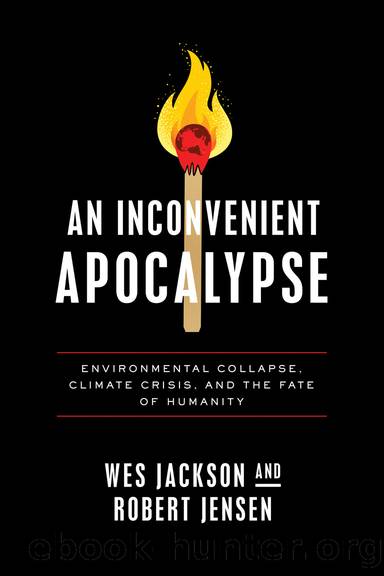An Inconvenient Apocalypse by Wes Jackson & Robert Jensen

Author:Wes Jackson & Robert Jensen
Language: eng
Format: epub
Publisher: University of Notre Dame Press
Published: 2022-07-14T00:00:00+00:00
Is Collapse Coming?
We realize that âapocalypseâ for many people has become synonymous with a reactionary theology that turns a book of the Christian Bible into the handbook for a death cultâs predictions of horrors to come and fantasies about a magical deliverance for the righteous. Thatâs not us.
We are focused on the evidence about the biophysical realities we need to face, paying close attention to the assessments of people with relevant expertise. For example, a survey of more than two hundred scientists from fifty-two countries who study global change highlighted a set of global risksâclimate change, extreme weather, biodiversity loss, food crises, and water crisesâthat could lead to a global systemic crisis.13 Their conclusion: âTogether these five risks threaten the continued integrity of the biosphere and its capacity to support itself and human life.â Increasingly, scientists are speaking of the connection between ecological crises and an unsustainable economic system.14
With assessments like this stacking up, itâs irresponsible not to ask hard questions. Are the political and economic systems that shape the contemporary world consistent with a sustainable large-scale human presence on the planet? Does mass-consumption consumer capitalism premised on endless growth have a future? How long can a high-energy/ high-technology system that draws down the nonrenewable ecological capital of the planet expect to continue?
We are apocalyptic; we think modern systems are coming to an end, and we need to lift the veil that obscures an honest assessment of what those end times will require of us. But we are not scholarly âcollapsologists,â15 a term that has been used by some to describe an emerging research community studying systemic risk in industrial society. We have great interest in the question but have not studied the history of societal collapses in the kind of depth that might allow us to make predictions,16 which we donât like making anyway. We also are not practicing âcollapsonautsâ17 in our daily lives, in the sense of belonging to a group that is creating alternative ways of living âoff the grid.â18 We try to be frugal but havenât significantly changed our own living arrangements, beyond keeping a certain distance from a lot of so-called cutting-edge technology and trying to practice traditional virtues of thrift.
Still, basic questions are impossible to avoid. How much time do industrial societies have left, and what is their collapse going to look like? For some people in the most vulnerable locations, collapse has already begun. Is collapse coming for us all? The questions are now common enough to warrant a feature in the New York Times Magazine that summarizes the scholarly research on collapse.19 The same newspaper ran a story on the popularity of a British professorâs paper arguing that it is too late to prevent a breakdown in modern civilization in most countries within our lifetimes.20 Curiously, the article ran in the âStyleâ section.21
Scholars study past collapses and look for patterns that can help us plan for the future, but they have yet to come up with a widely accepted definition of collapse.
Download
An Inconvenient Apocalypse by Wes Jackson & Robert Jensen.epub
This site does not store any files on its server. We only index and link to content provided by other sites. Please contact the content providers to delete copyright contents if any and email us, we'll remove relevant links or contents immediately.
The Secret History by Donna Tartt(19090)
The Social Justice Warrior Handbook by Lisa De Pasquale(12190)
Thirteen Reasons Why by Jay Asher(8910)
This Is How You Lose Her by Junot Diaz(6887)
Weapons of Math Destruction by Cathy O'Neil(6281)
Zero to One by Peter Thiel(5802)
Beartown by Fredrik Backman(5754)
The Myth of the Strong Leader by Archie Brown(5508)
The Fire Next Time by James Baldwin(5446)
How Democracies Die by Steven Levitsky & Daniel Ziblatt(5219)
Promise Me, Dad by Joe Biden(5153)
Stone's Rules by Roger Stone(5088)
A Higher Loyalty: Truth, Lies, and Leadership by James Comey(4964)
100 Deadly Skills by Clint Emerson(4926)
Rise and Kill First by Ronen Bergman(4789)
Secrecy World by Jake Bernstein(4753)
The David Icke Guide to the Global Conspiracy (and how to end it) by David Icke(4720)
The Farm by Tom Rob Smith(4514)
The Doomsday Machine by Daniel Ellsberg(4490)
